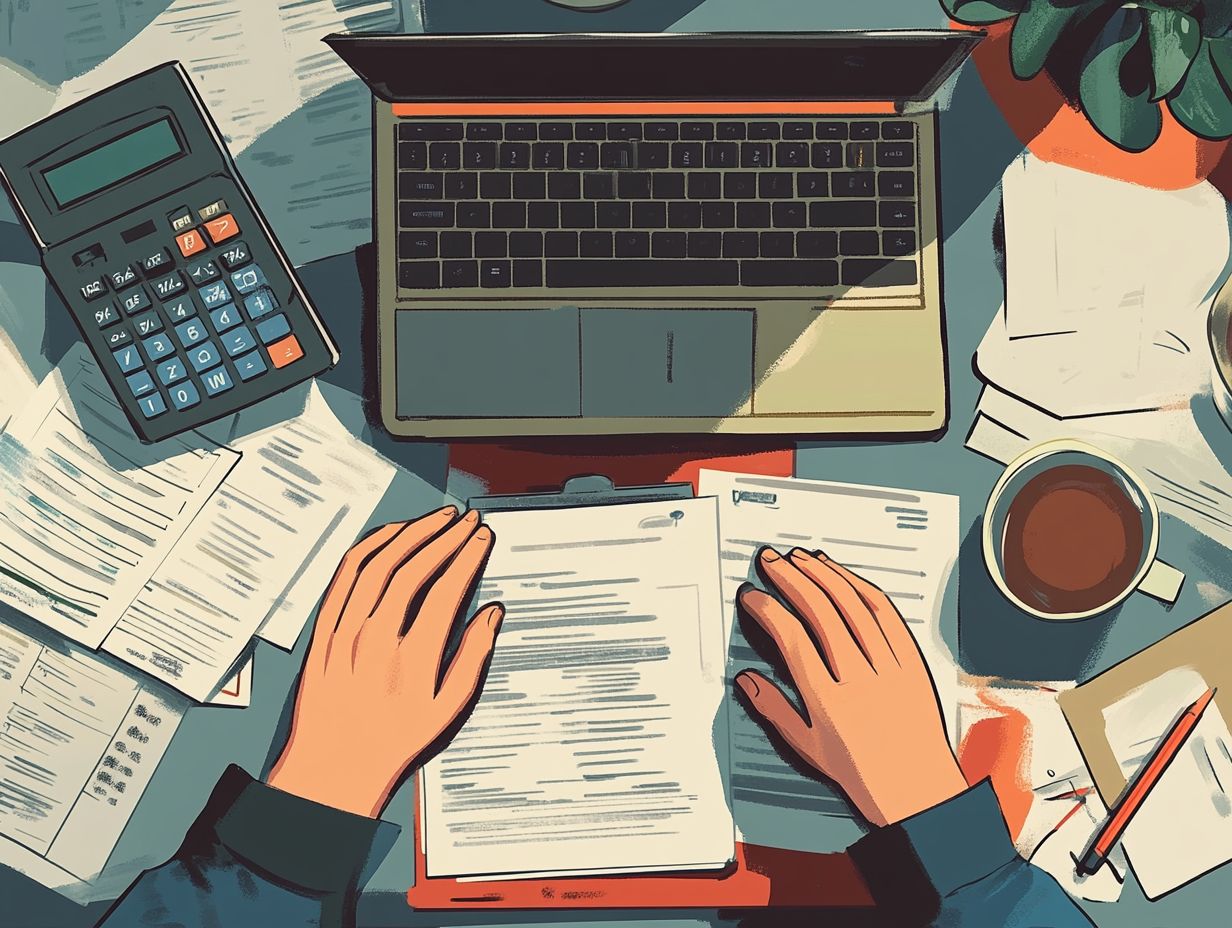How to Rebuild Your Credit Score After a Setback
Understanding your credit score is crucial for navigating your financial landscape. Let s dive into the essentials of credit scores, shedding light on what they are and the key factors that influence them.
You might encounter common setbacks, such as missed payments or high credit utilization, which can take a toll on your score. If you’ve faced these challenges, rest assured there are actionable steps you can take to rebuild your credit. We’ll also share tips for maintaining a strong score over the long haul.
Prepare to seize control of your financial future!
Contents
- Key Takeaways:
- Understanding Your Credit Score
- Common Setbacks that Can Affect Your Credit Score
- Steps to Rebuild Your Credit Score
- Create a Budget and Stick to It
- Pay Off Outstanding Debts
- Consider Credit Counseling
- Maintaining a Good Credit Score
- Tips for Maintaining a Good Credit Score
- Frequently Asked Questions
- What is considered a setback for my credit score?
- How can I start rebuilding my credit score after a setback?
- Will paying off my debt immediately improve my credit score?
- Should I close old credit accounts or keep them open?
- How long does it take to rebuild a credit score after a setback?
- Can I rebuild my credit score on my own?
Key Takeaways:

- Understand what a credit score is and the factors that affect it.
- Common setbacks that can lower your credit score include missed payments and bankruptcy or foreclosure.
- Take charge of your credit! Start by reviewing your credit report, creating a budget and sticking to it, paying off outstanding debts, and considering credit counseling.
Understanding Your Credit Score
Your credit score is essential for your financial well-being, reflecting your creditworthiness and overall stability. Typically assessed through various credit scoring models, including the FICO Score, your score is shaped by several factors.
These factors include your payment history, amounts owed, credit utilization (the ratio of your credit card balances to your credit limits), and the diversity of credit accounts you hold. By grasping how these elements influence your score, you enable yourself to make informed decisions that can enhance your financial future.
What is a Credit Score?
A credit score is essentially a numerical snapshot of your creditworthiness, calculated through various credit scoring models, with the FICO Score being among the most recognized. This score plays a pivotal role in your financial transactions, as it allows lenders to evaluate the risk associated with extending you credit.
Typically ranging from 300 to 850, a higher score reflects a more favorable credit history, significantly influencing your chances of loan approval and the interest rates available to you. A robust credit score not only opens the door to loans but can also lead to lower premiums on insurance policies and more advantageous terms on rental agreements.
On the flip side, if your score is on the lower end, you may encounter higher borrowing costs and, in some cases, even face denial of credit altogether.
Factors that Affect Your Credit Score
Your credit score is influenced by several key factors: payment history, amounts owed, credit utilization, credit mix, and how often you apply for credit.
Understanding these elements is essential for enhancing your financial health. For instance, your payment history constitutes a significant portion of your score consistently making payments on time can positively impact it, while missed payments can cause a sharp decline.
Similarly, the amounts owed, which reflect your total credit balances in relation to your credit limits, play a substantial role. High balances on revolving accounts can raise red flags for lenders. Your credit utilization should ideally remain below 30%.
Keep your balances low and diversify your credit accounts. These steps can help improve your score. It s also crucial to address any errors on your credit reports promptly; even a minor mistake can adversely affect your score.
For instance, if a closed account is mistakenly listed as open or a payment is inaccurately reported as late, correcting these inaccuracies can lead to significant improvements in your score.
Common Setbacks that Can Affect Your Credit Score
Common setbacks like missed payments, high credit utilization, bankruptcy, and foreclosure can significantly impact your credit score. These issues can create a landscape of bad credit that may hinder your financial well-being.
Missed Payments

Missed payments play a pivotal role in credit scoring. Your payment history significantly influences your overall credit score.
When you miss payments, you not only face the immediate threat of higher interest rates but also put at risk your ability to secure favorable loan terms down the line. A lower credit score can lead to increased insurance premiums and more stringent qualification processes for credit options.
To sidestep these financial traps, it s essential to establish reminders or set up automatic payments for your bills whenever possible. Creating a budget can also prove invaluable in managing your expenses efficiently. This allows you to prioritize timely payments and safeguard your credit health.
High Credit Utilization
High credit utilization occurs when your credit card balances exceed recommended levels relative to your credit limits. This poses a significant risk to your credit score.
Addressing this situation is crucial. Maintaining a low credit utilization ratio is one of the key factors influencing your overall credit health.
When your utilization is higher than acceptable, it can signal to lenders that you might be overly reliant on credit. This could lead to unfavorable borrowing costs or even denial of credit applications.
To effectively manage your credit card limits and avoid financial challenges, consider these strategies:
- Pay off your balances more frequently.
- Request limit increases.
- Utilize only a fraction of your available credit.
Implementing these tactics not only protects your financial standing but also enhances your future borrowing opportunities.
Bankruptcy or Foreclosure
Experiencing bankruptcy or foreclosure can cast a long shadow on your credit score. This often leads to extended periods of bad credit that complicate your financial recovery.
This decline in creditworthiness typically shows up as lower scores. These can seriously impede your ability to secure future loans or mortgages.
Recovery can take time, but don t lose hope! The timeline for recovery varies greatly, often stretching across several years before you can work your way back to a more favorable credit history.
During this challenging period, accessing credit may become increasingly difficult. If you do manage to qualify for loans, you might find yourself facing higher interest rates.
As a result, the long-term effects can extend beyond mere financial limitations. Potential homebuyers or car owners may encounter significant barriers in achieving their personal financial aspirations.
Steps to Rebuild Your Credit Score
Act now to rebuild your credit score! Start by reviewing your credit report meticulously, creating a strategic budget, and, if necessary, consider seeking credit counseling.
These actions not only pave the way for improved financial stability but also enable you to regain control over your financial future.
Review Your Credit Report
Reviewing your credit report is a crucial first step in rebuilding your credit. It allows you to pinpoint and dispute errors that could be dragging down your score.
Start by obtaining your free annual credit report from the major agencies: Experian, Equifax, and TransUnion. Each agency provides a comprehensive account of your credit history, covering essential factors like payment history, credit utilization, and outstanding debts.
Once you have the reports, it s vital to scrutinize each entry for inaccuracies. If you spot any discrepancies, the next step is to file a dispute with the relevant credit bureau. Be sure to detail the specific error and include any supporting documentation.
This methodical approach not only helps you correct your credit report but also enables you to take command of your financial health.
Create a Budget and Stick to It

Creating a budget and sticking to it is key to handling your money, ensuring timely payments on existing debts, and building a solid savings fund for future needs.
By diligently tracking your income and expenses, find easy ways to save money! This practice alleviates the stress that comes with financial uncertainty and enhances your ability to meet monthly obligations while improving your credit score over time.
Prioritize essential payments like mortgages and utilities while trimming discretionary spending; this can make a significant difference.
Regularly review and adjust your budget to adapt to unexpected financial changes. This ensures you stay on the path toward achieving financial wellness.
Pay Off Outstanding Debts
Paying off outstanding debts is crucial for boosting your credit score, as settling those debts directly impacts your credit utilization and overall financial well-being.
Adopt effective strategies like the debt snowball and debt avalanche methods to systematically tackle your outstanding balances. The debt snowball method means you pay off your smallest debts first for quick wins that can significantly enhance your motivation. The debt avalanche focuses on paying off the debts with the highest interest rates first, ultimately reducing the total interest paid over time.
Both approaches help you clear your balances and contribute to an improved credit score by enhancing your payment history and lowering your credit utilization rates. This leads to better financial health overall, setting you on the path to a more secure future.
Consider Credit Counseling
Considering credit counseling services can offer you invaluable guidance and support as you navigate financial challenges and work to enhance your credit score.
These services equip you with essential tools to craft effective budgets, manage your debt, and demystify the complexities of credit reports. With access to educational resources, you can discover strategies for cultivating healthier financial habits. A key component of rebuilding your credit may involve becoming an authorized user on someone else’s credit account, which can potentially boost your credit score, provided the primary account holder maintains a solid payment history.
By integrating these strategies with professional counseling, you can lay the groundwork for a more secure financial future.
Maintaining a Good Credit Score
Maintaining a strong credit score demands a commitment to sound credit habits. This means regularly monitoring your credit and establishing payment reminders to guarantee that your payments are made on time.
Adopting these practices positions you for financial success and peace of mind.
Tips for Maintaining a Good Credit Score
- Set payment reminders or setup automatic bill pay today to avoid late fees!
- Manage your credit card balances effectively; keep your utilization below 30% of your total credit limit to showcase responsible credit use.
- Be mindful of credit inquiries, as each hard inquiry can temporarily lower your score.
Educating yourself about these factors and actively monitoring your credit reports enables you to make informed decisions, ultimately fostering a robust credit profile.
Frequently Asked Questions

What is considered a setback for my credit score?
A setback for your credit score can include missed payments, high credit card balances, or a bankruptcy or foreclosure on your credit report.
How can I start rebuilding my credit score after a setback?
First, review your credit report for mistakes or bad items. Create a budget and payment plan to ensure you pay all bills on time.
Consider talking to a credit counselor for extra help.
Will paying off my debt immediately improve my credit score?
Paying off your debt can boost your credit score. However, it may take time for this improvement to show on your credit report.
Should I close old credit accounts or keep them open?
Keep your old credit accounts open! They contribute to the length of your credit history and can positively impact your score.
If an account has a high interest rate or fees, consider closing it.
How long does it take to rebuild a credit score after a setback?
The time varies for everyone, depending on how severe the setback was. With consistent good behavior, you could see significant improvement in several months to a year.
Can I rebuild my credit score on my own?
Yes! You can rebuild your credit score by making timely payments and keeping your credit card balances low. Regularly check your credit report for mistakes.
Getting help from a credit counselor or financial advisor can also be beneficial.






